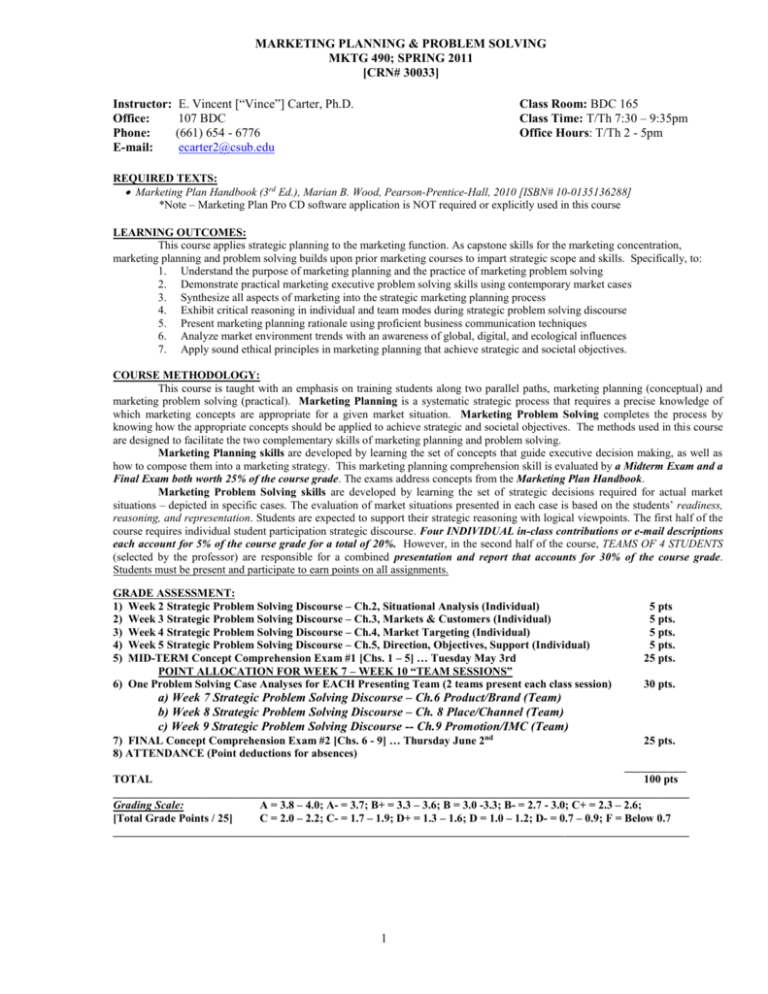
MARKETING PLANNING & PROBLEM SOLVING
MKTG 490; SPRING 2011
[CRN# 30033]
Instructor: E. Vincent [“Vince”] Carter, Ph.D.
Office:
107 BDC
Phone:
(661) 654 - 6776
E-mail:
ecarter2@csub.edu
Class Room: BDC 165
Class Time: T/Th 7:30 – 9:35pm
Office Hours: T/Th 2 - 5pm
REQUIRED TEXTS:
Marketing Plan Handbook (3rd Ed.), Marian B. Wood, Pearson-Prentice-Hall, 2010 [ISBN# 10-0135136288]
*Note – Marketing Plan Pro CD software application is NOT required or explicitly used in this course
LEARNING OUTCOMES:
This course applies strategic planning to the marketing function. As capstone skills for the marketing concentration,
marketing planning and problem solving builds upon prior marketing courses to impart strategic scope and skills. Specifically, to:
1. Understand the purpose of marketing planning and the practice of marketing problem solving
2. Demonstrate practical marketing executive problem solving skills using contemporary market cases
3. Synthesize all aspects of marketing into the strategic marketing planning process
4. Exhibit critical reasoning in individual and team modes during strategic problem solving discourse
5. Present marketing planning rationale using proficient business communication techniques
6. Analyze market environment trends with an awareness of global, digital, and ecological influences
7. Apply sound ethical principles in marketing planning that achieve strategic and societal objectives.
COURSE METHODOLOGY:
This course is taught with an emphasis on training students along two parallel paths, marketing planning (conceptual) and
marketing problem solving (practical). Marketing Planning is a systematic strategic process that requires a precise knowledge of
which marketing concepts are appropriate for a given market situation. Marketing Problem Solving completes the process by
knowing how the appropriate concepts should be applied to achieve strategic and societal objectives. The methods used in this course
are designed to facilitate the two complementary skills of marketing planning and problem solving.
Marketing Planning skills are developed by learning the set of concepts that guide executive decision making, as well as
how to compose them into a marketing strategy. This marketing planning comprehension skill is evaluated by a Midterm Exam and a
Final Exam both worth 25% of the course grade. The exams address concepts from the Marketing Plan Handbook.
Marketing Problem Solving skills are developed by learning the set of strategic decisions required for actual market
situations – depicted in specific cases. The evaluation of market situations presented in each case is based on the students’ readiness,
reasoning, and representation. Students are expected to support their strategic reasoning with logical viewpoints. The first half of the
course requires individual student participation strategic discourse. Four INDIVIDUAL in-class contributions or e-mail descriptions
each account for 5% of the course grade for a total of 20%. However, in the second half of the course, TEAMS OF 4 STUDENTS
(selected by the professor) are responsible for a combined presentation and report that accounts for 30% of the course grade.
Students must be present and participate to earn points on all assignments.
GRADE ASSESSMENT:
1) Week 2 Strategic Problem Solving Discourse – Ch.2, Situational Analysis (Individual)
2) Week 3 Strategic Problem Solving Discourse – Ch.3, Markets & Customers (Individual)
3) Week 4 Strategic Problem Solving Discourse – Ch.4, Market Targeting (Individual)
4) Week 5 Strategic Problem Solving Discourse – Ch.5, Direction, Objectives, Support (Individual)
5) MID-TERM Concept Comprehension Exam #1 [Chs. 1 – 5] … Tuesday May 3rd
POINT ALLOCATION FOR WEEK 7 – WEEK 10 “TEAM SESSIONS”
6) One Problem Solving Case Analyses for EACH Presenting Team (2 teams present each class session)
5 pts
5 pts.
5 pts.
5 pts.
25 pts.
30 pts.
a) Week 7 Strategic Problem Solving Discourse – Ch.6 Product/Brand (Team)
b) Week 8 Strategic Problem Solving Discourse – Ch. 8 Place/Channel (Team)
c) Week 9 Strategic Problem Solving Discourse -- Ch.9 Promotion/IMC (Team)
7) FINAL Concept Comprehension Exam #2 [Chs. 6 - 9] … Thursday June 2nd
8) ATTENDANCE (Point deductions for absences)
25 pts.
___________
TOTAL
100 pts
______________________________________________________________________________________________________
Grading Scale:
A = 3.8 – 4.0; A- = 3.7; B+ = 3.3 – 3.6; B = 3.0 -3.3; B- = 2.7 - 3.0; C+ = 2.3 – 2.6;
[Total Grade Points / 25]
C = 2.0 – 2.2; C- = 1.7 – 1.9; D+ = 1.3 – 1.6; D = 1.0 – 1.2; D- = 0.7 – 0.9; F = Below 0.7
______________________________________________________________________________________________________
1
Dr. Carter [Spring 2011]
COURSE SYLLABUS
MARKETING PLANNING & PROBLEM SOLVING [MKTG 490]
COURSE POLICIES:
1) ATTENDANCE & PUNCTUALITY IS REQUIRED: ONE (1) point is deducted for absence, lateness, and leaving early. Make up
exams and assignments are ONLY provided for University sanctioned events, athletic or musical activities.
*NOTE: MORE THAN 5 ABSENCES WILL RESULT IN THE LOSS OF ONE (1) ENTIRE GRADE LEVEL
MORE THAN 10 ABSENCES WILL RESULT IN THE LOSS OF TWO (2) ENTIRE GRADE LEVELS
2) ASSIGNMENT FORMAT: All course assignments should be typed using Microsoft Office applications ONLY.
3) ADJUSTMENTS & EXTRA-CREDIT: The instructor reserves the right to modify the course schedule and assignment/point
requirements based on unforeseen time constraints, student performance, or classroom circumstances. Students will be notified in advance of
any proposed course modifications. Likewise, a range of Extra-Credit point opportunities will be provided in the form of individual or group
assignments/activities.
4) ACADEMIC INTEGRITY: This course fully complies with the University policy for Academic Integrity and Academic Dishonesty.
Sanctions are enforced in accordance with the CSUB Catalog.
5) ACCOMMODATIONS FOR PHYSICAL OR LEARNING DISABILITIES: This course fully supports accommodations.
COURSE SCHEDULE:
• WEEK 1:
Introduction to Marketing Planning and Problem Solving Course
1) Clarify the course’s contribution to marketing concentration competency
2) Read syllabus and discuss course requirements
3) “Case Analysis Guide” http://www.mhhe.com/business/management/thompson/11e/case/prepare2.htm
4) Begin INDIVIDUAL MARKET PLAN student discussion (Ref. Drucker “Management of Oneself”)
• WEEK 2A:
Situational Analysis Planning Concepts
1) Complete INDIVIDUAL MARKET PLAN student discussion (Ref. Drucker “Management of Oneself”)
2) Read chapter 1 – “Intro. to Marketing Planning” for Overview – Product/Market Growth (Ex. 1.3)
3) Read chapter 2 – “Analyzing the Current Situation” (pp. 21 – 36)
4) Marketing planning concept focus – SWOT Analysis (Exhibit 2.1 & course web link)
5) Discuss strategic concept lessons -- including Exam item review
• WEEK 2B:
Situational Analysis Problem Solving Capacity
1) Review chapter 2 – “Analyzing the Current Situation” (pp. 21 – 36)
2) Study assigned case
3) Perform assigned marketing problem solving strategic discourse in class
• WEEK 3A:
Market/Customer Intelligence Planning Concepts
1) Read chapter 3 – “Understanding Markets and Customers” (pp. 37 – 52)
2) Marketing planning concept focus – Market Types & Customer Traits (Ex. 3.2 & 3.3)
3) Discuss strategic concept lessons -- including Exam item review
• WEEK 3B:
Market/Customer Intelligence Problem Solving Capacity
1) Review chapter 3 – “Understanding Markets and Customers” (pp. 37 – 52)
2) Study assigned case
3) Perform assigned marketing problem solving strategic discourse in class
• WEEK 4A:
Market Targeting Planning Concepts
1) Read chapter 4 – “Planning Segmentation, Targeting & Positioning” (pp. 53 – 67)
2) Marketing planning concept focus – Assess & Position (Ex.4.1,4.4 & course web link)
3) Discuss strategic concept lessons -- including Exam item review
• WEEK 4B:
Market Targeting Problem Solving Capacity
1) Review chapter 4 – “Planning Segmentation, Targeting & Positioning” (pp. 53 – 67)
2) Study assigned case
3) Perform assigned marketing problem solving strategic discourse in class
• WEEK 5A:
Market Targeting Planning Concepts
1) Read chapter 5 – “Planning Direction, Objectives, & Marketing Support” (pp. 68 – 79)
2) Marketing planning concept focus – Direction & Objectives (Ex. 5.1 with 1.3 and 5.2)
3) Discuss strategic concept lessons -- including Exam item review
• WEEK 5B:
Market Targeting Problem Solving Capacity
1) Review chapter 5 – “Planning Direction, Objectives, & Marketing Support” (pp. 68 – 79)
2) Study assigned case
3) Perform assigned marketing problem solving strategic discourse in class
• WEEK 6A:
Team Project Orientation & Midterm Exam Review (Optional Attendance)
*** WEEK 6B (5/5) MID-TERM EXAM (20pts.) Marketing Planning Text Concepts (Chs. 1 – 5) ***
2
Dr. Carter [Spring 2011]
COURSE SYLLABUS
MARKETING PLANNING & PROBLEM SOLVING [MKTG 490]
*** START 2ND SECTION OF COURSE – “TEAM PLANNING & PROBLEM SOLVING STRATEGIES” ***
• WEEK 7:
PRODUCT/BRAND Planning & Problem Solving Strategy
1) Read chapter 6 – “Developing Product & Brand Strategy” (pp. 80 – 94)
2) Marketing planning concept focus – Brand Benefits & PLC (Ex. 6.3 & 6.4 - PLC only)
3) Think about and discuss student “market situation” presentations
4)
• WEEK 8:
Perform assigned marketing problem solving strategic discourse in class
PLACE Planning & Problem Solving Strategy
1) Review chapter 8 “Developing Channel & Logistics Strategy” (pp. 111 – 138)
2) Ch.8 marketing planning concept focus – Channel Levels & Presence (Ex. 8.2 & 8.3)
3) Student “market situation” presentations (15 – 20 minutes per group)
4) Think about and discuss student “market situation” presentations
5)
• WEEK 9:
Perform assigned marketing problem solving strategic discourse in class
PROMOTION Planning & Problem Solving Strategy
1) Review chapter 9 – “Developing IMC Strategy” (pp. 124 - 138)
2) Marketing planning concept focus – Promotion Mix & Media Mix (Ex. 9.3 & 9.4)
3) Student “market situation” presentations (15 – 20 minutes per group)
4) Think about and discuss student “market situation” presentations
5)
• WEEK 10A (5/31):
Perform assigned marketing problem solving strategic discourse in class
PRICE STRATEGY IN-CLASS “EXTRA-CREDIT” LAB (No Presentation)
1) Review chapter 7 “Developing Pricing Strategy” (pp. 95 – 110)
2) Ch.7 marketing planning concept focus – Setting Price (Ex. 7.6,7.7 & course web link on “C + M = S”)
*** THURSDAY JUNE 2nd FINAL EXAM (25pts.) Marketing Planning Text Concepts (Chs. 6 – 9) ***
LET’S HAVE FUN LEARNING!!!
3







